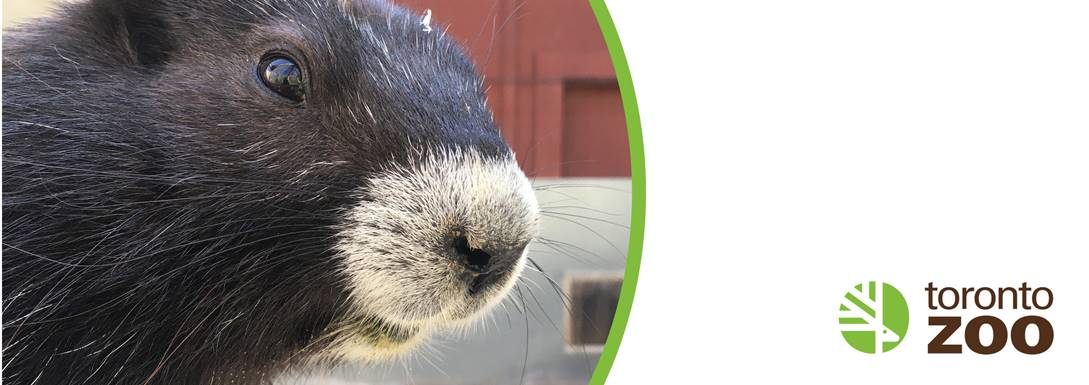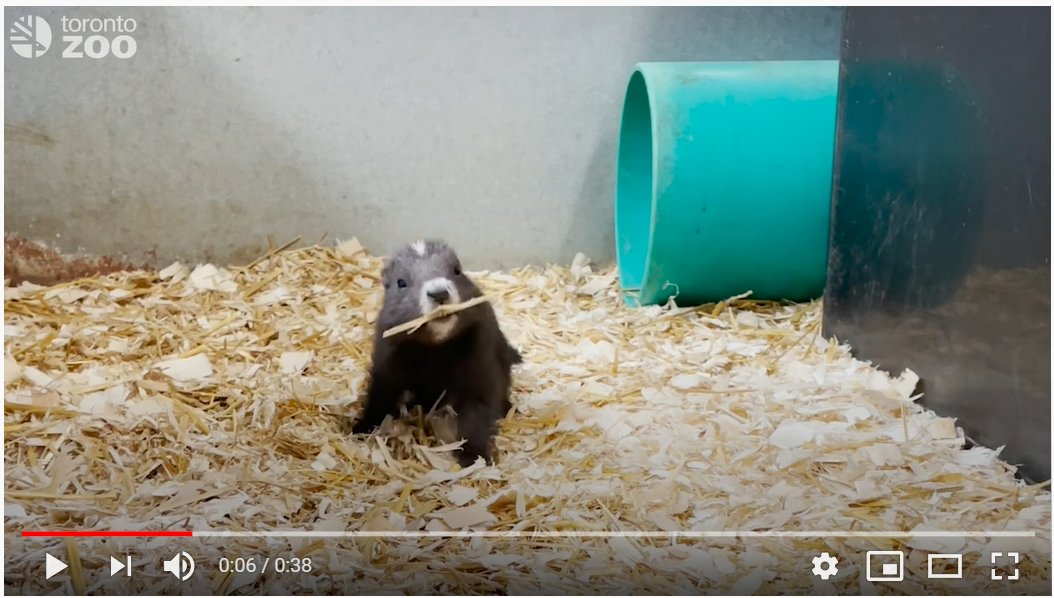
CANADIAN CONSERVATION BREEDING SUCCESS CONTINUES AT YOUR TORONTO ZOO WITH BIRTHS OF CRITICALLY ENDANGERED VANCOUVER ISLAND MARMOT PUPS

TO WATCH VANCOUVER ISLAND MARMOT PUPS,
TORONTO, ON, Thursday, June 24, 2021: Your Toronto Zoo is excited to announce the births of six Vancouver Island marmot pups this year. This important conservation breeding program is part of the Zoo’s ongoing commitment to save wildlife to further protect biodiversity.
Since 1997, your Toronto Zoo has been part of the conservation breeding program for the Vancouver Island marmot, Canada’s most endangered mammal and one of the most critically endangered animals in the world. Only 30 individuals were left in the wild in 2003, but the population on Vancouver Island is now estimated at 200-300 marmots thanks to the marmot recovery program. To date, 165 marmot pups have been born and raised at the Zoo, with over 140 of those released into the wild. Research and recovery efforts continue to protect the marmot and its habitat on Vancouver Island, BC.
Seven pairs of adult marmots currently call the Toronto Zoo home, and two pairs successfully produced offspring this spring. On April 30, pup sounds were heard from Oban and Frances’ nest box, confirmed to have five pups this year. On May 15, squeaks were also heard from Mayne and Laura Beth’s nest box, and Keepers have confirmed the pair have one pup. Keepers do not open the nest boxes until three to four weeks after first hearing sounds to minimize disturbance. Now reaching two months old, the older pups have started to emerge from their nest box and have been venturing throughout their indoor and outdoor enclosures.
“The Vancouver Island marmot is one of the rarest mammals in the world and thanks to conservation breeding programs and recovery efforts, the species has been given a chance at survival,” said Dolf DeJong, CEO, your Toronto Zoo. “Your Zoo plays a critical role as one of only a few conservation breeding centres for many endangered species in Canada. Our ability to contribute to increasing marmot populations is only because of our highly trained professional staff who monitor and manage these populations and the unique facilities that house these programs,” he added.
At your Toronto Zoo, breeding pairs of marmots are kept out of the public eye in one of our specialized conservation breeding centres along Meadowvale Road and have minimal human-animal contact for behavioural purposes. Our marmots are provided with specialized diets and multiple enclosures, which are furnished to allow for natural behaviours such as nesting, digging, gnawing and watching for predators. Breeding takes place shortly after the marmots awake from hibernation in March or April, and gestation lasts only 30 days, though not every pair breeds every year. Baby marmots, called pups, usually come in litters of three to four animals and remain hidden in the nests made by their parents within sheltered nest boxes for the first few weeks of their lives. Specially trained Wildlife Care Keepers rely on hearing the squeaks the newborn marmots make to communicate with their mothers that signal which pairs have successfully bred. Often the pups are nearly a month old before they begin exploring beyond their nest boxes where the keepers can see them. The pups grow quickly throughout the summer, and by the fall, are independent of their parents. While some pups stay in the managed breeding program, most will be sent to Vancouver Island where they make the final preparations for their first over-winter hibernation and eventual release into the wild.
These breeding and reintroduction programs are putting more endangered species back into the wild. But as important as they are, these conservation programs are funded almost entirely by donations and grants. Your support for our Toronto Zoo’s endangered animal conservation programs – for our marmots, and all the endangered animals at the Zoo – means you are a partner in the fight against extinction. Find out how you can support these programs through the Toronto Zoo Wildlife Conservancy.
-30-
To learn more about Toronto Zoo’s projects to support Canadian species:
Media Contact Information:
Katie Gray
Manager of Strategic Communications
[email protected]
Amanda Chambers
Toronto Zoo’s Supervisor of Strategic Communications
[email protected]






For general information visit torontozoo.com
The Toronto Zoo’s mission is to connect people, animals and conservation science to fight extinction and our vision is a world where wildlife and wild spaces thrive.
An iconic tourist attraction and Conservation organization, the Toronto Zoo boasts a number of leading programs for helping wildlife and their natural habitats – from species reintroduction to reproductive research. A world-class educational centre for people of all ages, the Toronto Zoo is open every day including December 25 and attracts approximately 1.2 million guests each year.
Toronto Zoo is accredited by Canada's Accredited Zoos and Aquariums (CAZA) and the Association of Zoos and Aquariums (AZA). The Zoo has also achieved the Canadian Council on Animal Care (CCAC) Certificate of Good Animal Practice® and is inspected by the Ontario Ministry of Agriculture, Food and Rural Affairs (OMAFRA).
Toronto Zoo, 361A Old Finch Ave, Toronto ON, M1B 5K7
To unsubscribe, please send your request to [email protected].
View Toronto Zoo’s Privacy Statement
